Unit 2 What time do you go to school?单元知识点总结人教版七年级英语下册
文档属性
| 名称 | Unit 2 What time do you go to school?单元知识点总结人教版七年级英语下册 |
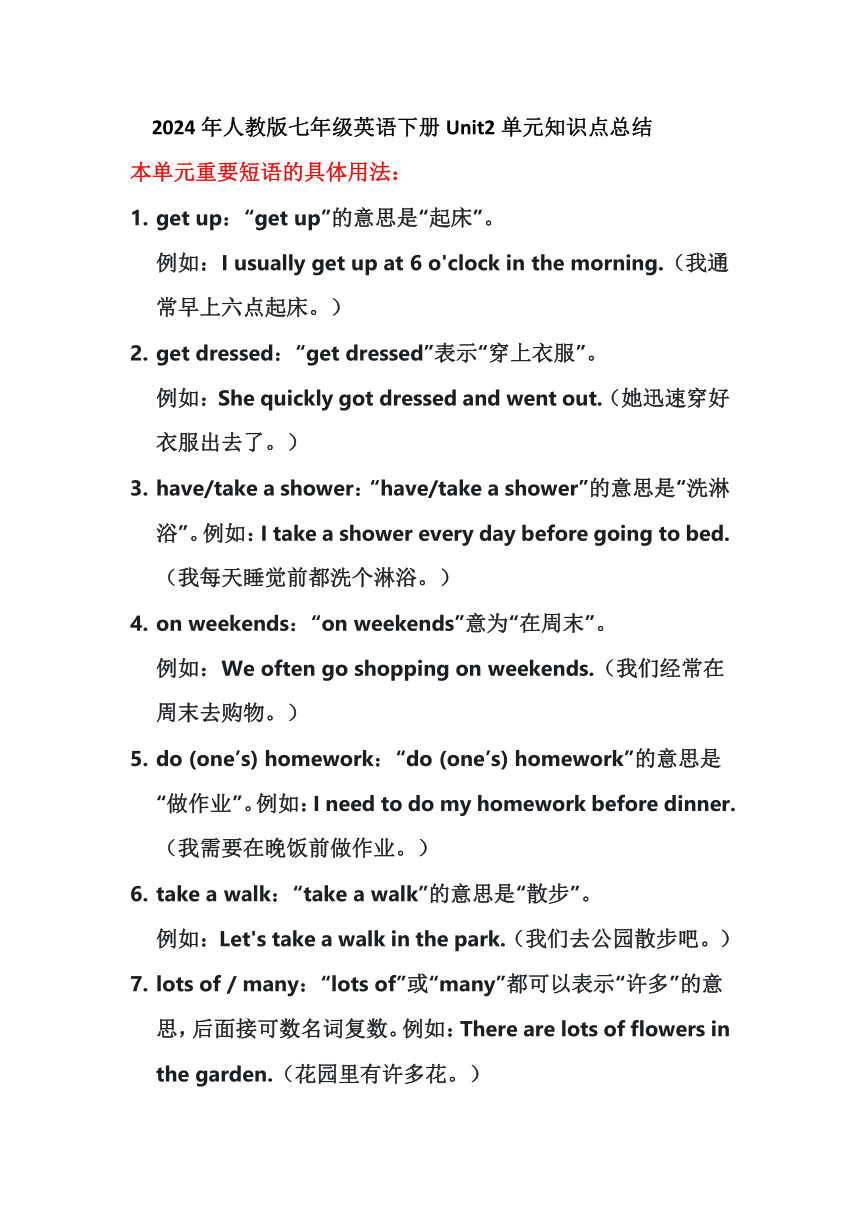
|
|
| 格式 | docx | ||
| 文件大小 | 20.9KB | ||
| 资源类型 | 教案 | ||
| 版本资源 | 人教新目标(Go for it)版 | ||
| 科目 | 英语 | ||
| 更新时间 | 2024-02-23 11:04:25 | ||
图片预览

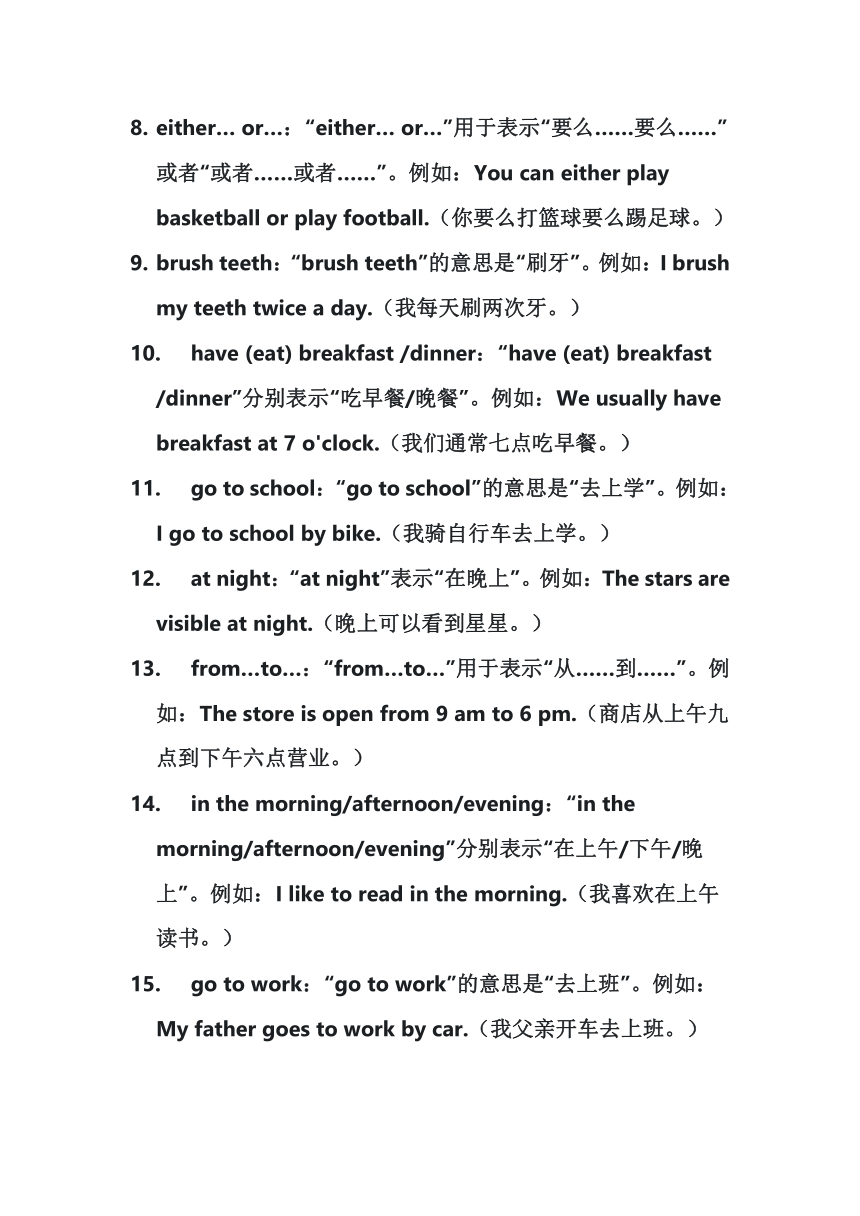
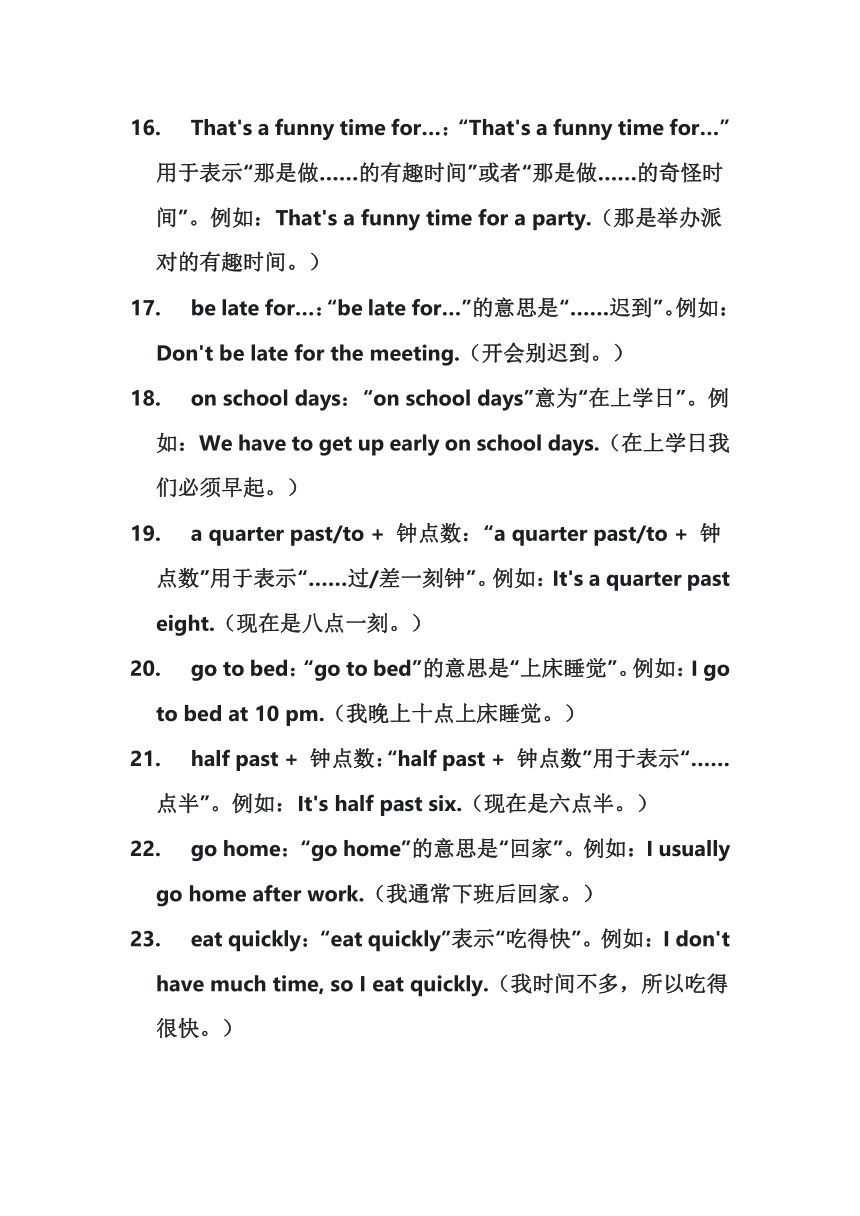
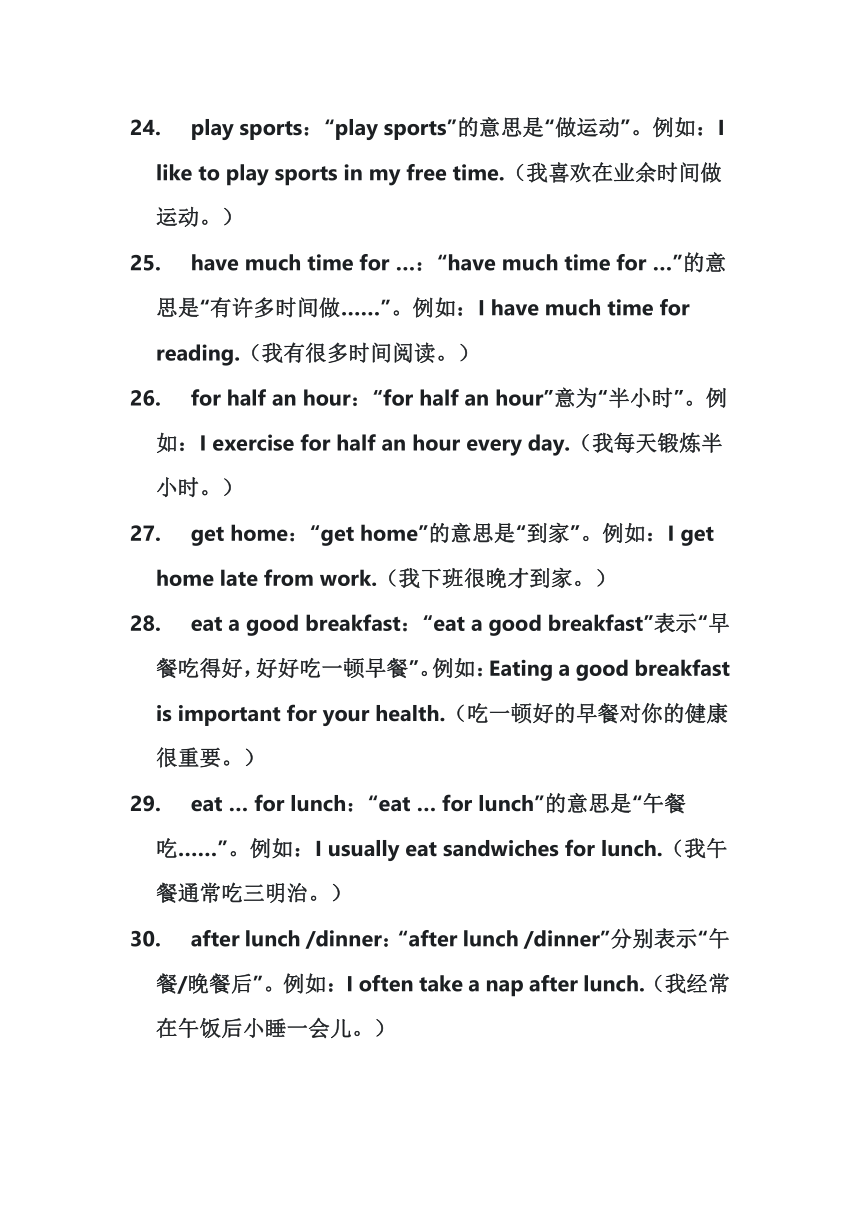
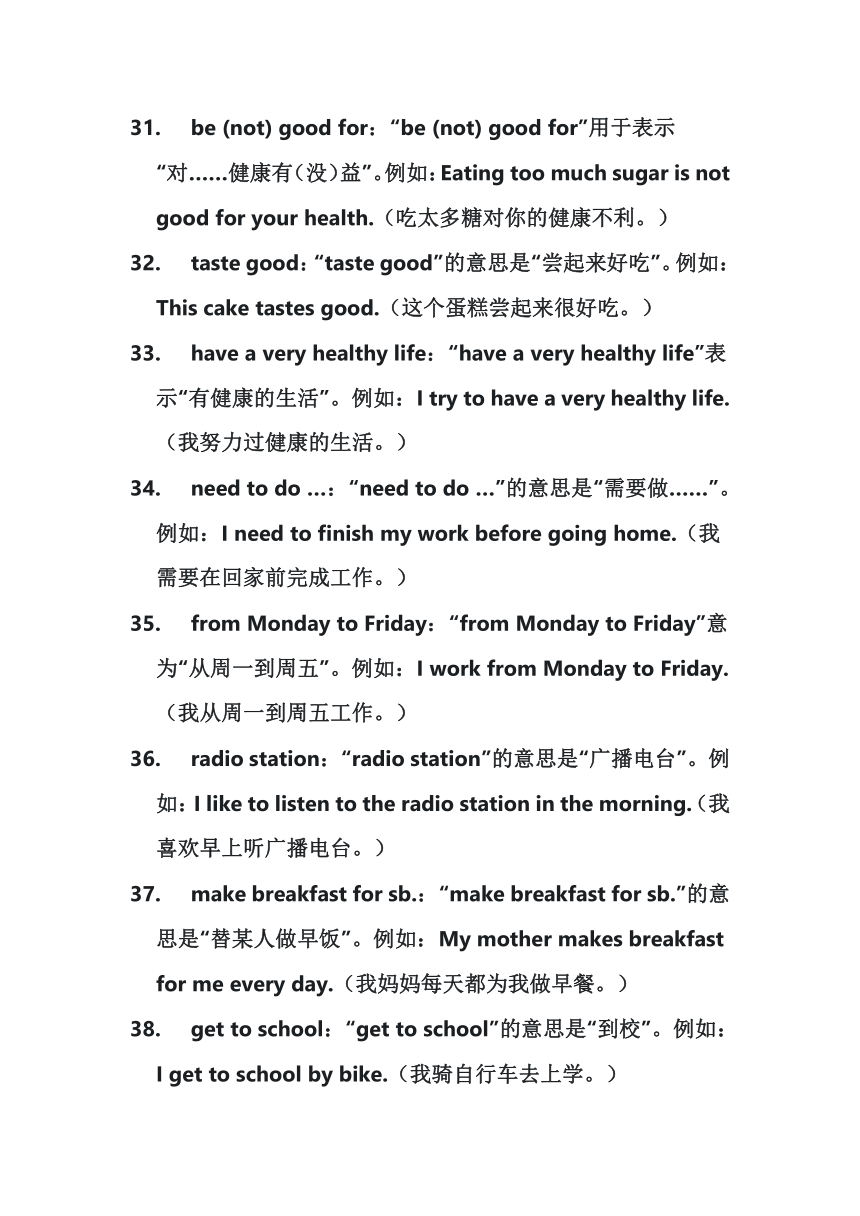
文档简介
2024年人教版七年级英语下册Unit2单元知识点总结
本单元重要短语的具体用法:
get up:“get up”的意思是“起床”。
例如:I usually get up at 6 o'clock in the morning.(我通常早上六点起床。)
get dressed:“get dressed”表示“穿上衣服”。
例如:She quickly got dressed and went out.(她迅速穿好衣服出去了。)
have/take a shower:“have/take a shower”的意思是“洗淋浴”。例如:I take a shower every day before going to bed.(我每天睡觉前都洗个淋浴。)
on weekends:“on weekends”意为“在周末”。
例如:We often go shopping on weekends.(我们经常在周末去购物。)
do (one’s) homework:“do (one’s) homework”的意思是“做作业”。例如:I need to do my homework before dinner.(我需要在晚饭前做作业。)
take a walk:“take a walk”的意思是“散步”。
例如:Let's take a walk in the park.(我们去公园散步吧。)
lots of / many:“lots of”或“many”都可以表示“许多”的意思,后面接可数名词复数。例如:There are lots of flowers in the garden.(花园里有许多花。)
either… or…:“either… or…”用于表示“要么……要么……”或者“或者……或者……”。例如:You can either play basketball or play football.(你要么打篮球要么踢足球。)
brush teeth:“brush teeth”的意思是“刷牙”。例如:I brush my teeth twice a day.(我每天刷两次牙。)
have (eat) breakfast /dinner:“have (eat) breakfast /dinner”分别表示“吃早餐/晚餐”。例如:We usually have breakfast at 7 o'clock.(我们通常七点吃早餐。)
go to school:“go to school”的意思是“去上学”。例如:I go to school by bike.(我骑自行车去上学。)
at night:“at night”表示“在晚上”。例如:The stars are visible at night.(晚上可以看到星星。)
from…to…:“from…to…”用于表示“从……到……”。例如:The store is open from 9 am to 6 pm.(商店从上午九点到下午六点营业。)
in the morning/afternoon/evening:“in the morning/afternoon/evening”分别表示“在上午/下午/晚上”。例如:I like to read in the morning.(我喜欢在上午读书。)
go to work:“go to work”的意思是“去上班”。例如:My father goes to work by car.(我父亲开车去上班。)
That's a funny time for…:“That's a funny time for…”用于表示“那是做……的有趣时间”或者“那是做……的奇怪时间”。例如:That's a funny time for a party.(那是举办派对的有趣时间。)
be late for…:“be late for…”的意思是“……迟到”。例如:Don't be late for the meeting.(开会别迟到。)
on school days:“on school days”意为“在上学日”。例如:We have to get up early on school days.(在上学日我们必须早起。)
a quarter past/to + 钟点数:“a quarter past/to + 钟点数”用于表示“……过/差一刻钟”。例如:It's a quarter past eight.(现在是八点一刻。)
go to bed:“go to bed”的意思是“上床睡觉”。例如:I go to bed at 10 pm.(我晚上十点上床睡觉。)
half past + 钟点数:“half past + 钟点数”用于表示“……点半”。例如:It's half past six.(现在是六点半。)
go home:“go home”的意思是“回家”。例如:I usually go home after work.(我通常下班后回家。)
eat quickly:“eat quickly”表示“吃得快”。例如:I don't have much time, so I eat quickly.(我时间不多,所以吃得很快。)
play sports:“play sports”的意思是“做运动”。例如:I like to play sports in my free time.(我喜欢在业余时间做运动。)
have much time for …:“have much time for …”的意思是“有许多时间做……”。例如:I have much time for reading.(我有很多时间阅读。)
for half an hour:“for half an hour”意为“半小时”。例如:I exercise for half an hour every day.(我每天锻炼半小时。)
get home:“get home”的意思是“到家”。例如:I get home late from work.(我下班很晚才到家。)
eat a good breakfast:“eat a good breakfast”表示“早餐吃得好,好好吃一顿早餐”。例如:Eating a good breakfast is important for your health.(吃一顿好的早餐对你的健康很重要。)
eat … for lunch:“eat … for lunch”的意思是“午餐吃……”。例如:I usually eat sandwiches for lunch.(我午餐通常吃三明治。)
after lunch /dinner:“after lunch /dinner”分别表示“午餐/晚餐后”。例如:I often take a nap after lunch.(我经常在午饭后小睡一会儿。)
be (not) good for:“be (not) good for”用于表示“对……健康有(没)益”。例如:Eating too much sugar is not good for your health.(吃太多糖对你的健康不利。)
taste good:“taste good”的意思是“尝起来好吃”。例如:This cake tastes good.(这个蛋糕尝起来很好吃。)
have a very healthy life:“have a very healthy life”表示“有健康的生活”。例如:I try to have a very healthy life.(我努力过健康的生活。)
need to do …:“need to do …”的意思是“需要做……”。例如:I need to finish my work before going home.(我需要在回家前完成工作。)
from Monday to Friday:“from Monday to Friday”意为“从周一到周五”。例如:I work from Monday to Friday.(我从周一到周五工作。)
radio station:“radio station”的意思是“广播电台”。例如:I like to listen to the radio station in the morning.(我喜欢早上听广播电台。)
make breakfast for sb.:“make breakfast for sb.”的意思是“替某人做早饭”。例如:My mother makes breakfast for me every day.(我妈妈每天都为我做早餐。)
get to school:“get to school”的意思是“到校”。例如:I get to school by bike.(我骑自行车去上学。)
本单元重要句子:
1.---What time do you usually get up,Rick?
里克,你通常几点起床?
---I usually get up at six thirty.
我通常六点半起床
2.---When does Scott go to work?
斯科特什么时候去上班?
---He always goes to work at eleven o'clock.
他总是在十一点去上班。
3.In the evening, I either watch TV or play computer games.
晚上,我要么看电视,要么玩电脑游戏。
4. That’s a funny time for breakfast.
5. ---When do students usually eat dinner
---They usually eat dinner at a quarter to seven in the evening.
6. At twelve, she eats lots of fruit and vegetables for lunch.
7. She knows it’s not good for her, but it tastes good.
8. Here are your clothes.
本单元的知识点详细讲解:
1, 问时间用what time或者when
At+钟点 at 7 o’clock at noon/ at night(during/ in the day)
On+ 具体某天、星期、特指的一天 on April 1st on Sunday on a cold winter morning
In +年、月、上午、下午、晚上
2, 时间读法:顺读法
逆读法:分钟≤30用past five past eight(8:05) half past eight(8:30)
分钟>30用to a quarter to ten(9:45)
整点用 …o’clock 7 o’clock(7:00)
3,3个穿的区别:
wear 表状态,接服装、手套、眼镜、香水等
Put on 表动作,接服装
Dress 表动作,接sb/ oneself get dressed穿衣
3, 感叹句:How+adj+主谓!
How+adj+a/an +n单+主谓!
What+ a/an +adj+ n单+主谓!
What+ adj+ n复/ 不可数+主谓!
4, from…to…
5, be/ arrive late for
6, 频度副词(行前be 后)
Always usually often sometimes seldom hardly never
7,一段时间前面要用介词for for half an hour for five minutes
8, eat/ have… for breakfast/ lunch/ dinner/ supper
9, either…or either…or....
连接2个并列的成分,若连接2个名词或代词作主语时,谓语动词与最近的名词或代词保持一致,即遵循就近原则.
10,a lot of=lots of a lot of=lots of+可数n复数/不可数n a lot修饰动词
11,it is +adj+for sb +to do sth (adj修饰to do sth)It is important for me to learn English.
it is +adj+of sb +to do sth (adj修饰sb) It is kind/ friendly/ nice of you to help me.
12. exercise v.锻炼 u.n.锻炼c.n 练习题,某种具体的锻炼 做运动take exercise=do
exercise
语法知识讲解:
1.几个频率副词的用法
always 总是
usually 通常
often 经常
sometimes 有时
hardly 几乎不
never 从来不
区别:
按照频率发生的高低,可以将这几个词排列为
always > usually > often > sometimes > hardly > never。
精确的频率副词:
2、what time与when
" What time " 和 " when " 在英语中都可以用来询问时间,但在用法上有一些区别。以下是它们在中考中的一些区别:
具体时间点:"What time" 通常用于询问具体的时间点,例如具体的小时和分钟。例如:"What time is it now "(现在几点了?)或者 "What time does the class start "(课程什么时候开始?)
时间范围:"When" 更常用于询问更广泛的时间范围或某个事件发生的时间。例如:"When do you usually get up in the morning "(你通常早上什么时候起床?)或者 "When is the party going to be "(派对将在什么时候举行?)
用法灵活性:"When" 在询问时间时更加灵活,可以用于询问日期、月份、季节等。例如:"When is your birthday "(你的生日是什么时候?)或者 "When does summer start "(夏天什么时候开始?)
话题写作
主题:谈论日常作息习惯
My School Day
I am a student. I usually get up at seven, and I eat breakfast at seven thirty. Then I go to school at eight. School starts at eight thirty. I eat lunch at twelve. I go home at 17:00. I often eat dinner at 19:00 and then play the piano. I do my homework at 20:00. At 22:00, I go to bed.
本单元重要短语的具体用法:
get up:“get up”的意思是“起床”。
例如:I usually get up at 6 o'clock in the morning.(我通常早上六点起床。)
get dressed:“get dressed”表示“穿上衣服”。
例如:She quickly got dressed and went out.(她迅速穿好衣服出去了。)
have/take a shower:“have/take a shower”的意思是“洗淋浴”。例如:I take a shower every day before going to bed.(我每天睡觉前都洗个淋浴。)
on weekends:“on weekends”意为“在周末”。
例如:We often go shopping on weekends.(我们经常在周末去购物。)
do (one’s) homework:“do (one’s) homework”的意思是“做作业”。例如:I need to do my homework before dinner.(我需要在晚饭前做作业。)
take a walk:“take a walk”的意思是“散步”。
例如:Let's take a walk in the park.(我们去公园散步吧。)
lots of / many:“lots of”或“many”都可以表示“许多”的意思,后面接可数名词复数。例如:There are lots of flowers in the garden.(花园里有许多花。)
either… or…:“either… or…”用于表示“要么……要么……”或者“或者……或者……”。例如:You can either play basketball or play football.(你要么打篮球要么踢足球。)
brush teeth:“brush teeth”的意思是“刷牙”。例如:I brush my teeth twice a day.(我每天刷两次牙。)
have (eat) breakfast /dinner:“have (eat) breakfast /dinner”分别表示“吃早餐/晚餐”。例如:We usually have breakfast at 7 o'clock.(我们通常七点吃早餐。)
go to school:“go to school”的意思是“去上学”。例如:I go to school by bike.(我骑自行车去上学。)
at night:“at night”表示“在晚上”。例如:The stars are visible at night.(晚上可以看到星星。)
from…to…:“from…to…”用于表示“从……到……”。例如:The store is open from 9 am to 6 pm.(商店从上午九点到下午六点营业。)
in the morning/afternoon/evening:“in the morning/afternoon/evening”分别表示“在上午/下午/晚上”。例如:I like to read in the morning.(我喜欢在上午读书。)
go to work:“go to work”的意思是“去上班”。例如:My father goes to work by car.(我父亲开车去上班。)
That's a funny time for…:“That's a funny time for…”用于表示“那是做……的有趣时间”或者“那是做……的奇怪时间”。例如:That's a funny time for a party.(那是举办派对的有趣时间。)
be late for…:“be late for…”的意思是“……迟到”。例如:Don't be late for the meeting.(开会别迟到。)
on school days:“on school days”意为“在上学日”。例如:We have to get up early on school days.(在上学日我们必须早起。)
a quarter past/to + 钟点数:“a quarter past/to + 钟点数”用于表示“……过/差一刻钟”。例如:It's a quarter past eight.(现在是八点一刻。)
go to bed:“go to bed”的意思是“上床睡觉”。例如:I go to bed at 10 pm.(我晚上十点上床睡觉。)
half past + 钟点数:“half past + 钟点数”用于表示“……点半”。例如:It's half past six.(现在是六点半。)
go home:“go home”的意思是“回家”。例如:I usually go home after work.(我通常下班后回家。)
eat quickly:“eat quickly”表示“吃得快”。例如:I don't have much time, so I eat quickly.(我时间不多,所以吃得很快。)
play sports:“play sports”的意思是“做运动”。例如:I like to play sports in my free time.(我喜欢在业余时间做运动。)
have much time for …:“have much time for …”的意思是“有许多时间做……”。例如:I have much time for reading.(我有很多时间阅读。)
for half an hour:“for half an hour”意为“半小时”。例如:I exercise for half an hour every day.(我每天锻炼半小时。)
get home:“get home”的意思是“到家”。例如:I get home late from work.(我下班很晚才到家。)
eat a good breakfast:“eat a good breakfast”表示“早餐吃得好,好好吃一顿早餐”。例如:Eating a good breakfast is important for your health.(吃一顿好的早餐对你的健康很重要。)
eat … for lunch:“eat … for lunch”的意思是“午餐吃……”。例如:I usually eat sandwiches for lunch.(我午餐通常吃三明治。)
after lunch /dinner:“after lunch /dinner”分别表示“午餐/晚餐后”。例如:I often take a nap after lunch.(我经常在午饭后小睡一会儿。)
be (not) good for:“be (not) good for”用于表示“对……健康有(没)益”。例如:Eating too much sugar is not good for your health.(吃太多糖对你的健康不利。)
taste good:“taste good”的意思是“尝起来好吃”。例如:This cake tastes good.(这个蛋糕尝起来很好吃。)
have a very healthy life:“have a very healthy life”表示“有健康的生活”。例如:I try to have a very healthy life.(我努力过健康的生活。)
need to do …:“need to do …”的意思是“需要做……”。例如:I need to finish my work before going home.(我需要在回家前完成工作。)
from Monday to Friday:“from Monday to Friday”意为“从周一到周五”。例如:I work from Monday to Friday.(我从周一到周五工作。)
radio station:“radio station”的意思是“广播电台”。例如:I like to listen to the radio station in the morning.(我喜欢早上听广播电台。)
make breakfast for sb.:“make breakfast for sb.”的意思是“替某人做早饭”。例如:My mother makes breakfast for me every day.(我妈妈每天都为我做早餐。)
get to school:“get to school”的意思是“到校”。例如:I get to school by bike.(我骑自行车去上学。)
本单元重要句子:
1.---What time do you usually get up,Rick?
里克,你通常几点起床?
---I usually get up at six thirty.
我通常六点半起床
2.---When does Scott go to work?
斯科特什么时候去上班?
---He always goes to work at eleven o'clock.
他总是在十一点去上班。
3.In the evening, I either watch TV or play computer games.
晚上,我要么看电视,要么玩电脑游戏。
4. That’s a funny time for breakfast.
5. ---When do students usually eat dinner
---They usually eat dinner at a quarter to seven in the evening.
6. At twelve, she eats lots of fruit and vegetables for lunch.
7. She knows it’s not good for her, but it tastes good.
8. Here are your clothes.
本单元的知识点详细讲解:
1, 问时间用what time或者when
At+钟点 at 7 o’clock at noon/ at night(during/ in the day)
On+ 具体某天、星期、特指的一天 on April 1st on Sunday on a cold winter morning
In +年、月、上午、下午、晚上
2, 时间读法:顺读法
逆读法:分钟≤30用past five past eight(8:05) half past eight(8:30)
分钟>30用to a quarter to ten(9:45)
整点用 …o’clock 7 o’clock(7:00)
3,3个穿的区别:
wear 表状态,接服装、手套、眼镜、香水等
Put on 表动作,接服装
Dress 表动作,接sb/ oneself get dressed穿衣
3, 感叹句:How+adj+主谓!
How+adj+a/an +n单+主谓!
What+ a/an +adj+ n单+主谓!
What+ adj+ n复/ 不可数+主谓!
4, from…to…
5, be/ arrive late for
6, 频度副词(行前be 后)
Always usually often sometimes seldom hardly never
7,一段时间前面要用介词for for half an hour for five minutes
8, eat/ have… for breakfast/ lunch/ dinner/ supper
9, either…or either…or....
连接2个并列的成分,若连接2个名词或代词作主语时,谓语动词与最近的名词或代词保持一致,即遵循就近原则.
10,a lot of=lots of a lot of=lots of+可数n复数/不可数n a lot修饰动词
11,it is +adj+for sb +to do sth (adj修饰to do sth)It is important for me to learn English.
it is +adj+of sb +to do sth (adj修饰sb) It is kind/ friendly/ nice of you to help me.
12. exercise v.锻炼 u.n.锻炼c.n 练习题,某种具体的锻炼 做运动take exercise=do
exercise
语法知识讲解:
1.几个频率副词的用法
always 总是
usually 通常
often 经常
sometimes 有时
hardly 几乎不
never 从来不
区别:
按照频率发生的高低,可以将这几个词排列为
always > usually > often > sometimes > hardly > never。
精确的频率副词:
2、what time与when
" What time " 和 " when " 在英语中都可以用来询问时间,但在用法上有一些区别。以下是它们在中考中的一些区别:
具体时间点:"What time" 通常用于询问具体的时间点,例如具体的小时和分钟。例如:"What time is it now "(现在几点了?)或者 "What time does the class start "(课程什么时候开始?)
时间范围:"When" 更常用于询问更广泛的时间范围或某个事件发生的时间。例如:"When do you usually get up in the morning "(你通常早上什么时候起床?)或者 "When is the party going to be "(派对将在什么时候举行?)
用法灵活性:"When" 在询问时间时更加灵活,可以用于询问日期、月份、季节等。例如:"When is your birthday "(你的生日是什么时候?)或者 "When does summer start "(夏天什么时候开始?)
话题写作
主题:谈论日常作息习惯
My School Day
I am a student. I usually get up at seven, and I eat breakfast at seven thirty. Then I go to school at eight. School starts at eight thirty. I eat lunch at twelve. I go home at 17:00. I often eat dinner at 19:00 and then play the piano. I do my homework at 20:00. At 22:00, I go to bed.
同课章节目录
- Unit 1 Can you play the guitar?
- Section A
- Section B
- Unit 2 What time do you go to school?
- Section A
- Section B
- Unit 3 How do you get to school?
- Section A
- Section B
- Unit 4 Don't eat in class.
- Section A
- Section B
- Unit 5 Why do you like pandas?
- Section A
- Section B
- Unit 6 I'm watching TV.
- Section A
- Section B
- Review of Units 1-6
- Unit 7 It's raining!
- Section A
- Section B
- Unit 8 Is there a post office near here?
- Section A
- Section B
- Unit 9 What does he look like?
- Section A
- Section B
- Unit 10 I'd like some noodles.
- Section A
- Section B
- Unit 11 How was your school trip?
- Section A
- Section B
- Unit 12 What did you do last weekend?
- Section A
- Section B
